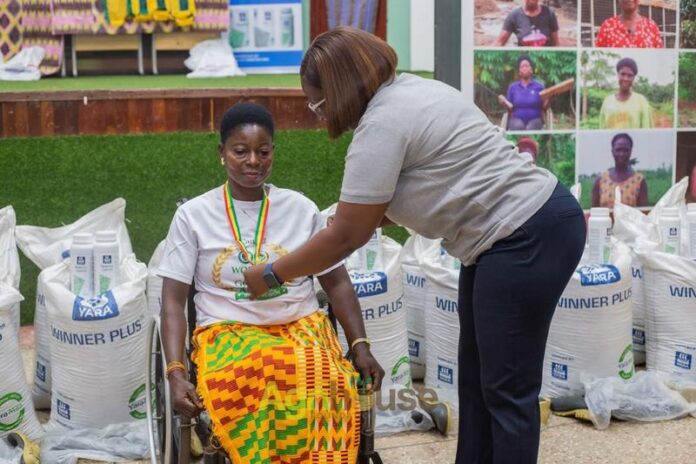The Country Manager for Yara Ghana Limited, Theresa Randolph, has called for collective action among the government and stakeholders in the agricultural value chain to overcome barriers facing women in agribusiness.
Speaking at the 6th Women in Food and Agricultural Leadership Training Forum (WOFAGRIC) and Gold in the Soil Awards, organized by Agrihouse Foundation in the Bono Region, Madam Randolph underscored the crucial role of agribusiness in Ghana’s economy, contributing over 20% to the nation’s GDP.
She highlighted that agribusiness includes the entire value chain, offering significant opportunities for growth, poverty reduction, and climate change mitigation.
Despite its importance, agribusiness faces numerous challenges, particularly for women farmers and those with disabilities, who often encounter additional hurdles such as lack of land ownership, limited access to finance, and restricted market opportunities.
Madam Randolph urged the government to implement policies that ensure equal land rights for women and enhance their access to financial services.
She called for legal reforms to protect women’s property rights and facilitate their ownership of land and assets.
She also stressed the need for sustainable improvements in agricultural productivity to meet growing demand, enhance food system efficiency, and improve income opportunities in rural areas.
“Overcoming these barriers requires concerted efforts from all stakeholders, including governments, private sector entities, NGOs, and international agencies,” Randolph said. She emphasized the importance of improving women’s access to high-quality agricultural inputs, technologies, and market opportunities, as well as providing education and training in modern agricultural practices and sustainable farming techniques.
Yara Ghana Limited has been at the forefront of supporting agribusiness development, focusing on women and persons with disabilities through initiatives like WOFAGRIC and the Gold in the Soil Awards.
The company aims to break barriers, create opportunities, and enhance food system efficiency by providing quality crop solutions and agronomic knowledge.
“Empowering women in agribusiness is essential for the sustainable development of the agricultural sector and the broader economy. By addressing barriers and creating an enabling environment, we can unlock the potential of women farmers and contribute to a more resilient and prosperous agricultural sector,” Randolph remarked.
She also highlighted Yara Ghana’s commitment to innovation and technology in agriculture, citing initiatives such as digital farming solutions and tailored agronomic training programs.
Supported by partners like AFAP, AGRA, and USAID, the Grow Ghana Initiative has increased staple crop productivity, created jobs for over 500 youth, and provided vital agronomic knowledge.
Madam Randolph expressed pride in Yara Ghana’s collaboration with the Agrihouse Foundation over the past six years, supporting the Women in Food and Agricultural Leadership Training Forum (WOFAGRIC) and Gold in the Soil Awards.
She urged all stakeholders to work together for a vibrant and inclusive agricultural sector.
Alberta Nana Akyaa Akosa, Executive Director of Agrihouse Foundation, expressed gratitude for Yara Ghana’s partnership.
She noted that their support has advanced the status of women in agriculture in Ghana, enabling the foundation to expand its reach and impact.
ALSO READ:


